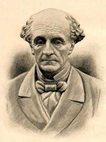101 ordspråk av John Stuart Mill
 John Stuart Mill
John Stuart Mill
John Stuart Mill föddes den 20 mei 1806 och dog den 8 mei 1873 - English economist
Mer info via Google eller Bing.
Mer info via Google eller Bing.
Aantal gezegden is 1469552
varav 1407627 på engelska
Gezegde (1469552 st) Zoek
Categoriën (2627 st) Zoek
Auteurs (167535 st) Zoek
Afbeeldingen (4592 st)
Geboren (10495 st)
Gestorven (3318 st)
Datums (9517 st)
Landen (5315 st)
Idiom (4438 st)
Lengths
Toplists (6 st)
Deze website richt zich op uitdrukkingen in de Zweedse taal, en sommige onderdelen inclusief onderstaande links zijn niet vertaald in het Nederlands. Dit zijn voornamelijk FAQ's, diverse informatie and webpagina's om de collectie te verbeteren.
Här har vi samlat ordstäv och talesätt i 35 år!
Vad är gezegde?
Hur funkar det?
Vanliga frågor
Om samlingen
Ordspråkshjältar
Hjälp till!
varav 1407627 på engelska
Gezegde (1469552 st) Zoek
Categoriën (2627 st) Zoek
Auteurs (167535 st) Zoek
Afbeeldingen (4592 st)
Geboren (10495 st)
Gestorven (3318 st)
Datums (9517 st)
Landen (5315 st)
Idiom (4438 st)
Lengths
Toplists (6 st)
Deze website richt zich op uitdrukkingen in de Zweedse taal, en sommige onderdelen inclusief onderstaande links zijn niet vertaald in het Nederlands. Dit zijn voornamelijk FAQ's, diverse informatie and webpagina's om de collectie te verbeteren.
Här har vi samlat ordstäv och talesätt i 35 år!
Vad är gezegde?
Hur funkar det?
Vanliga frågor
Om samlingen
Ordspråkshjältar
Hjälp till!
 |
Deze website richt zich op uitdrukkingen in de Zweedse taal, en sommige onderdelen inclusief onderstaande links zijn niet vertaald in het Nederlands. Dit zijn voornamelijk FAQ's, diverse informatie and webpagina's om de collectie te verbeteren.
Här har vi samlat ordstäv och talesätt i 35 år!
Vad är gezegde?
Hur funkar det?
Vanliga frågor
Om samlingen
Ordspråkshjältar
Hjälp till!

